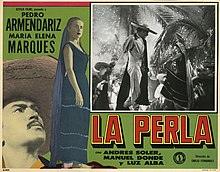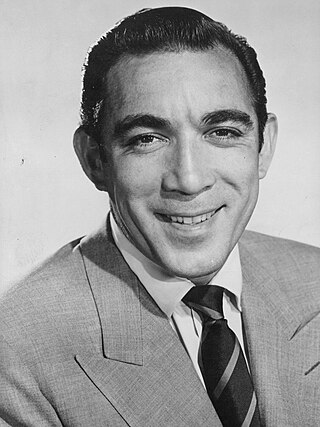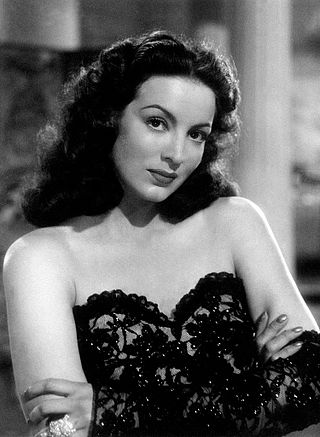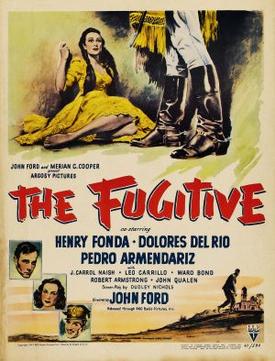This article needs additional citations for verification .(June 2019) |
This is a list of the films produced in Mexico in 1947, ordered alphabetically (see 1947 in film):

This article needs additional citations for verification .(June 2019) |
This is a list of the films produced in Mexico in 1947, ordered alphabetically (see 1947 in film):


Manuel Antonio Rodolfo Quinn Oaxaca, better known by his stage name Anthony Quinn, was an American actor. Born in Mexico to a Mexican mother and a first-generation Irish-Mexican father, he was known for his portrayal of earthy, passionate characters "marked by a brutal and elemental virility" in numerous critically acclaimed films both in Hollywood and abroad. His notable films include La Strada (1954), The Guns of Navarone (1961), Lawrence of Arabia (1962), Guns for San Sebastian (1968), The Shoes of the Fisherman (1968), Across 110th Street (1972), The Message (1976), Lion of the Desert (1980), Jungle Fever (1991) and Seven Servants (1996). His starring performance in Zorba the Greek (1964) earned him a Oscar nomination for Best Actor.

María de los Ángeles Félix Güereña was a Mexican actress and singer. Along with Pedro Armendáriz and Dolores del Río, she was one of the most successful figures of Latin American cinema in the 1940s and 1950s. Considered one of the most beautiful actresses of the Golden Age of Mexican cinema, her strong personality and taste for finesse garnered her the title of diva early in her career. She was known as La Doña, a name derived from her character in Doña Bárbara (1943), and María Bonita, thanks to the anthem composed exclusively for her as a wedding gift by Félix's second husband, Agustín Lara. Her acting career consists of 47 films made in Mexico, Spain, France, Italy and Argentina.

The Roswell incident is a collection of events and myths surrounding the 1947 crash of a United States Army Air Forces balloon near Roswell, New Mexico. Operated from the nearby Alamogordo Army Air Field and part of the top secret Project Mogul, the balloon was intended to detect Soviet nuclear tests. After metallic and rubber debris was recovered by Roswell Army Air Field personnel, the United States Army announced their possession of a "flying disc". This announcement made international headlines but was retracted within a day. Obscuring the true purpose and source of the crashed balloon, the Army subsequently stated that it was a conventional weather balloon.

Mexican cinema dates to the late nineteenth century during the rule of President Porfirio Díaz. Seeing a demonstration of short films in 1896, Díaz immediately saw the importance of documenting his presidency in order to present an ideal image of it. With the outbreak of the Mexican Revolution in 1910, Mexican and foreign makers of silent films seized the opportunity to document its leaders and events. From 1915 onward, Mexican cinema focused on narrative film.

Maria Antonieta Pons was a Cuban-born Mexican film actress and dancer. She was the first actress in the Rumberas films in the 1940s and 1950s, in the Golden Age of Mexican cinema. The Rumberas film genre offered a societal perspective on Mexico during the 40s-50s. It delved into the lives of women deemed as sinners or prostitutes, challenging the prevailing moral and social norms of their era.

Pedro Gregorio Armendáriz Hastings was a Mexican-American film actor who made films in both Mexico and the United States. With Dolores del Río and María Félix, he was one of the best-known Latin American movie stars of the 1940s and 1950s.

Linda Christian was a Mexican film actress, who appeared in Mexican and Hollywood films. Her career reached its peak in the 1940s and 1950s. She played Mara in the last Johnny Weissmuller Tarzan film Tarzan and the Mermaids (1948). She is also noted for being the first Bond girl, appearing in a 1954 television adaptation of the James Bond novel Casino Royale. In 1963 she starred as Eva Ashley in an episode of The Alfred Hitchcock Hour titled "An Out for Oscar".
Paul Sawtell was a Polish-born film score composer in the United States.

The Fugitive is a 1947 American drama film starring Henry Fonda and directed by John Ford, based on the 1940 novel The Power and the Glory by Graham Greene. The film was shot on location in Mexico.
Manuel "Manolo" Noriega, was a Spanish-born Mexican stage and film actor, screenwriter, and film director.
Roberto Gavaldón was a Mexican film director.

Chris-Pin Martin was an American character actor whose specialty lay in portraying comical Mexicans, particularly sidekicks in The Cisco Kid film series. He acted in over 100 films between 1925 and 1953, including over 50 westerns.

Pedro Infante Cruz was a Mexican ranchera singer and actor whose career spanned the golden age of Mexican cinema.
Manuel Esperón González was a Mexican songwriter and composer. Along with the famous Mexican author Ernesto Cortazar, Esperón cowrote many songs for Mexican films, including "¡Ay, Jalisco, no te rajes!" for the 1941 film of the same name, "Cocula" for El Peñón de las Ánimas (1943), and "Amor con amor se paga" for Hay un niño en su futuro (1952). Other Esperón compositions have become Latin standards such as "Yo soy mexicano", "Noche plateada" and "No volveré", which was used in the first episode of the 2001 soap opera El juego de la vida. Among other performers, Pedro Infante, Los Panchos, and Jorge Negrete have made his songs well-known. His fame in the US derives from when his song The Three Caballeros was used in the Disney film The Three Caballeros (1945).

Arturo García Rodríguez, known professionally as Arturo de Córdova, was a Mexican actor who appeared in over a hundred films.
Leslie Goodwins was an English film director and screenwriter. He directed nearly 100 films between 1926 and 1967, notably 27 features and shorts with Leon Errol, including the Mexican Spitfire series. His 1936 film Dummy Ache was nominated for an Academy Award in 1936 for Best Short Subject (Two-Reel). Dummy Ache was preserved by the Academy Film Archive and the Library of Congress in 2013. His 1937 film Should Wives Work? was also nominated for an Academy Award in the same category. He was born in London, England and he died in Hollywood, California.

Fiesta is a 1947 American Technicolor musical drama film directed by Richard Thorpe and starring Esther Williams, Ricardo Montalbán, Mary Astor and Cyd Charisse. It was released by Metro-Goldwyn-Mayer. The screenplay was written by George Bruce and Lester Cole.
The Rumberas film was a film genre that flourished in Mexico's Golden Age of Mexican cinema in the 1940s and 1950s. Its major stars were the so-called rumberas, dancers of Afro-Caribbean musical rhythms. The genre is a film curiosity, one of the most fascinating hybrids of the international cinema.

The Lone Wolf in Mexico is a 1947 American black-and-white mystery-adventure film directed by D. Ross Lederman for Columbia Pictures. It features Gerald Mohr as the title character, detective Lone Wolf. Chronologically the third-to-last Lone Wolf film in Columbia's theatrical series, it was followed by The Lone Wolf in London later in 1947 and The Lone Wolf and His Lady in 1949.